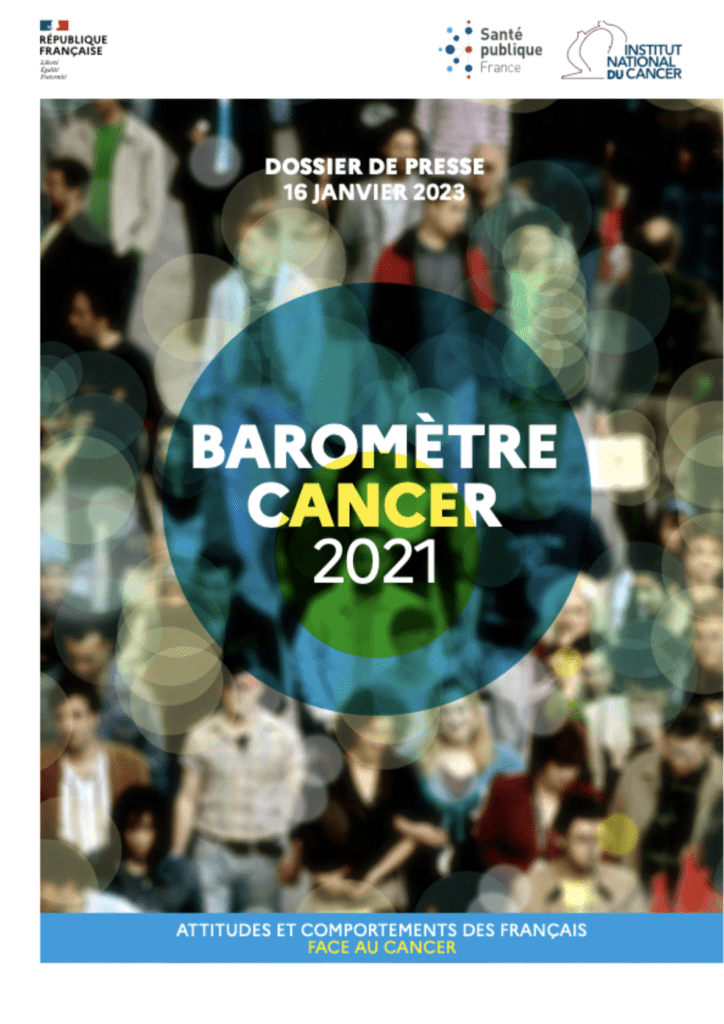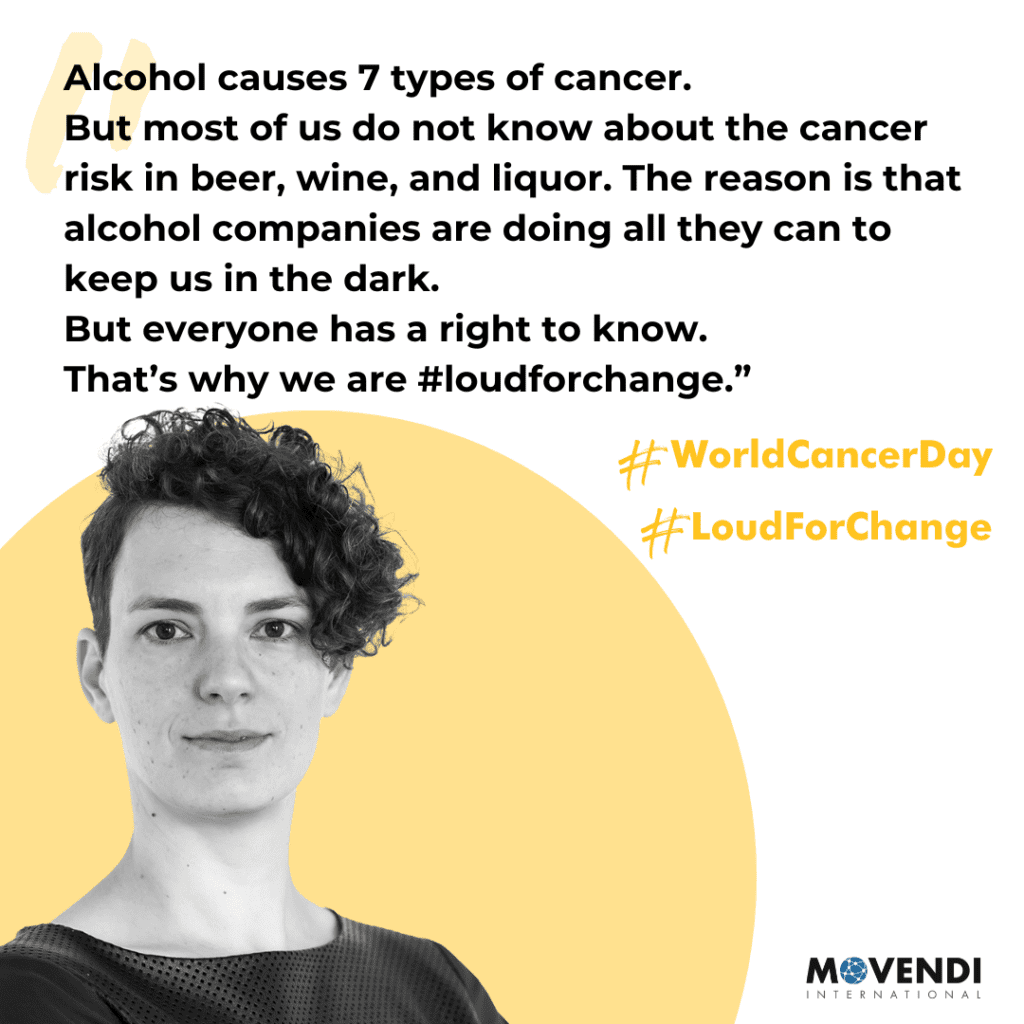The National Cancer Institute, in partnership with Santé Publique France, has released the results of the 4th Cancer Barometer. This Barometer is conducted every five years and provides an insight into the attitudes and behaviors of the French people concerning cancer. It is a tool for steering prevention policies and is also useful for devising differentiated practices for specific populations. The survey has been carried out every five years since 2005. Latest data was collected in 2021 from nearly 5,000 people aged between 15 and 85.
This year’s results indicate that the French public feels well informed about cancer. Nevertheless, perceptions of risk factors, particularly avoidable risk factors, are not always based on scientific knowledge. For instance, the French tend to cite psychological factors, such as stress and traumatic experiences, as risk factors for cancer, even though scientific evidence is lacking.
Cognitive dissonance in cancer risk exposure perception
The Barometer also highlights a cognitive dissonance between perception of cancer risk exposure by the individual due to their risk factor behavior and the real risk.
- For example people who smoke tobacco place themselves at less risk than non-smokers.
- People who consume alcohol cite alcohol less spontaneously as a cancer risk factor than people who do not use alcohol.
Inequalities
The results also reveal differences in perceptions, beliefs, and attitudes according to both the level of education and income among the French public.
- The least educated people are less likely to perceive the cancer risk linked to smoking.
- Women with the lowest incomes report less participation in cervical cancer screening, even though this screening is essential for women’s health care.
Persistence of misconceptions about cancer risk factors
The data also reveal that some misconceptions persist or even increase, compared to the previous edition of the Cancer Barometer.
- The statement that “cancer is hereditary” is strongly approved by people with less than a bachelor degree. This indicates the issue of health literacy (the motivation and skills of individuals to access, understand, evaluate, and use information to make decisions about their health).
Understanding of cancer risk factors
The results of the 4th Cancer Barometer show that people hold misconceptions that distance themselves from risk factors.
- For instance, around half of the people believe that playing sports helps clear the lungs of tobacco.
- Daily alcohol consumers consider themselves more informed about the cancer risks associated with alcohol use than people who do not consume alcohol.
- The link between alcohol and cancer is underestimated, especially among alcohol consumers.
- Only half of the French public is aware that one glass of alcohol per day increases the risk of cancer.
- Around a quarter of the population believes that consuming small amounts of wine reduces the risk of cancer.
These figures reveal that the harmful effects of alcohol use in general and the direct link between alcohol and cancer are not well-known across French society.
Furthermore, the impact of alcohol consumption on cancer is underestimated by individuals with a lower level of education than a high school diploma. They are more likely to believe that road accidents and violence are the main risks associated with alcohol consumption.
Be Loud for Change
The lack of awareness among the French public about the fact that alcohol causes seven types of cancer is a clear indication that Movendi International’s global campaign “Be Loud for Change” is vital to engage communities, raise awareness about the link between alcohol and cancer, and mobilize support for policy action.
French society is not the only one with low awareness about alcohol and cancer.
A 2018 review of 32 studies examining ordinary people’s awareness of alcohol as a risk factor for cancer in 16 countries showed that awareness appears to be low internationally.
In general, people are more likely to endorse alcohol as a risk factor when presented with a list of possible risk factors than when asked to list risk factors in an open-ended format.”
Jennifer K. Scheideler and William M.P. Klein, in: “Awareness of the Link between Alcohol Consumption and Cancer across the World: A Review” (2018)
Science knows about the link between cancer and alcohol since the 1980s. The International Agency for Research in Cancer (IARC), the WHO’s research body, classifies alcohol as class one carcinogen since 1988.
The IARC working group writes:
“There is sufficient evidence in humans for the carcinogenicity of alcohol consumption. Alcohol consumption causes cancers of the oral cavity, pharynx, larynx, oesophagus, colorectum, liver (hepatocellular carcinoma) and female breast.”
Personal Habits and Indoor Combustions, IARC Monographs on the Evaluation of Carcinogenic Risks to Humans Volume 100E (2012)
But awareness among decision-makers and the broader public has not caught up with the fact that alcohol is a cause of 7 types of cancer.
Today an extensive body of evidence exists and keeps growing, showing how strong the correlation between alcohol use and cancer risk is.
5 Facts about Alcohol and Cancer
- Alcohol causes at least seven types of cancer.
- The most common types of cancer due to alcohol are different for men and women.
- The risk of cancer from alcohol consumption increases from the first alcoholic drink.
- Using tobacco as well as alcohol multiplies cancer risks.
- Cancers due to alcohol consumption are preventable.
Research in Europe has shown that 1 in 10 Europeans are not aware of the connection between alcohol and cancer, and that one in five do not believe there is a connection between cancer and alcohol.
A reason to quit
Half of smokers would quit cigarettes if they knew the increased risk of mouth cancer that it causes.
And 40% of alcohol users would quit alcohol consumption if they knew the increased cancer risks.
Evidence shows that informing people, increasing awareness and understanding of alcohol’s cancer risks leads to bigger support for alcohol prevention and control.
Source Website: The National Cancer Institute [Translated from French]



